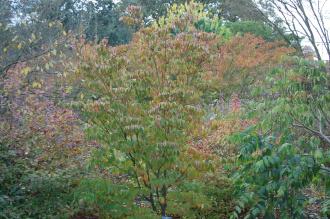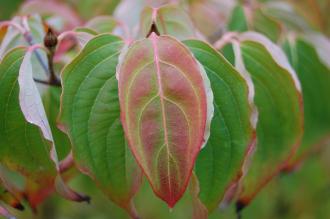
Cornus kousa var. chinensis (16/11/2013, Kew Gardens, London)
Position: Full sun to partial shade
Flowering period: Early summer
Soil: Moist, well drained
Eventual Height: 8m
Eventual Spread: 5m
Hardiness: 5a, 5b, 6a, 6b, 7a, 7b, 8a, 8b
Family: Cornaceae
Cornus kousa var. chinensis is a slow growing deciduous large shrub or small tree with a broadly conical habit. Its dark green leaves are ovate with entire margins, up to 8cm long and 4cm broad. Its leaves turn red/ orange before they fall in autumn. Its bark is flaking. Its green flowers are up to 1cm across, these are surrounded by four ovate cream coloured bracts which are up to 6cm long. Its red fruit is a fleshy compound berry, similar to the strawberry and up to 3cm across.
Cornus kousa var. chinensis, commonly known as Chinese Dogwood or Kousa Dogwood, is native to East China and Taiwan.
The etymological root of the binomial Cornus is from the Latin cornum meaning ‘horn’ due to its dense properties. Kousa is derived from the Japanese name for this tree. Chinensis is derived from the Latin meaning ‘ from China’.
The landscape architect may find Cornus kousa var. chinensis useful as an attractive small tree with prominent summer flowers, attractive autumn leaf color and attractive autumn fruit.
Ecologically, Cornus kousa var. chinensis fruit are attractive to some birds and mammals.

Cornus kousa var. chinensis Autumn Leaf (16/11/2013, Kew Gardens, London)
The Royal Horticultural Society has given the variety Cornus kousa var. chinensis ‘Wisley Queen’ their prestigious Award of Garden Merit in 2012.
Cornus kousa var. chinensis prefers moist, fertile, humus rich, well-drained soils. It prefers an neutral to acid pH of soil. It dislikes chalky soils.
Cornus kousa var. chinensis requires little maintenance. This plant dislikes hard pruning.

